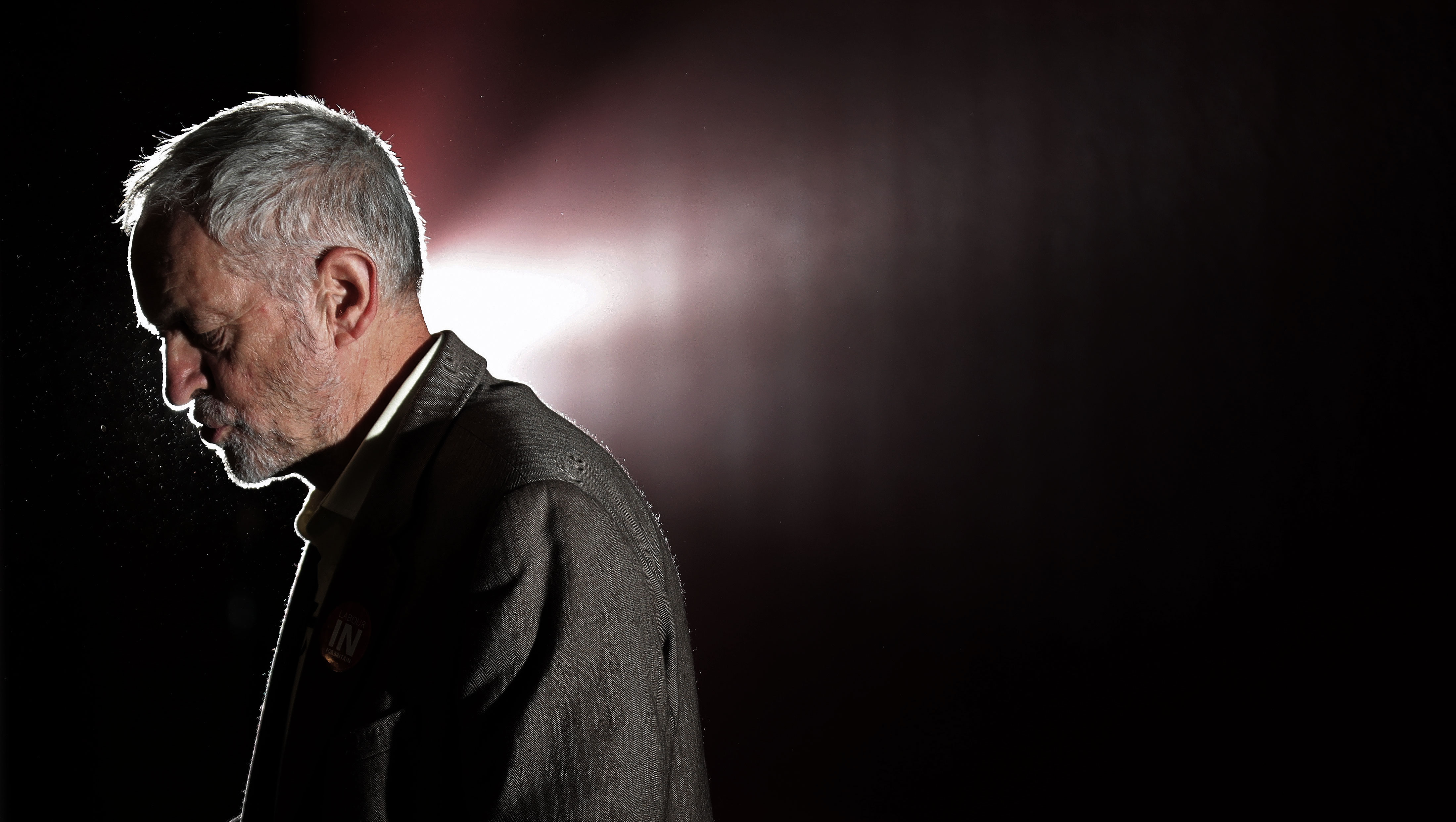Labour EHRC report: what is in the explosive anti-Semitism investigation?
Jeremy Corbyn suspended after rejecting findings of human rights watchdog

A free daily email with the biggest news stories of the day – and the best features from TheWeek.com
You are now subscribed
Your newsletter sign-up was successful
Jeremy Corbyn has been suspended and had the Labour whip removed after rejecting the findings of the long-awaited report into anti-Semitism.
A spokesperson for Keir Starmer said an investigation would be launched into Corbyn’s comments, after the UK’s human rights watchdog found Labour broke equality laws and was responsible for anti-Semitic discrimination under his leadership.
In a damning report into allegations of anti-Jewish hate within the party, the Equality and Human Rights Commission (EHRC) found “serious failings” in the Labour leadership’s effort to stamp out discrimination.
The Week
Escape your echo chamber. Get the facts behind the news, plus analysis from multiple perspectives.

Sign up for The Week's Free Newsletters
From our morning news briefing to a weekly Good News Newsletter, get the best of The Week delivered directly to your inbox.
From our morning news briefing to a weekly Good News Newsletter, get the best of The Week delivered directly to your inbox.
The EHRC also found “a practice of political interference in certain complaints” by the then-leader of the opposition’s office (LOTO), directly contradicting Corbyn’s claims that there was no interference in the complaints process by his inner circle.
What does the report say?
Caroline Waters, interim chair of the EHRC, writes that the investigation found “multiple areas” where Labour’s approach and leadership on tackling anti-Semitism was insufficient. “This is inexcusable and appeared to be a result of a lack of willingness to tackle anti-Semitism rather than an inability to do so,” she added.
In what The Guardian describes as a “particularly serious finding”, the report highlights “a practice of political interference in certain complaints”, meaning the party leadership under Corbyn did play a role in the handling of complaints over anti-Jewish hate.
A free daily email with the biggest news stories of the day – and the best features from TheWeek.com
The EHRC found 23 instances of inappropriate involvement by LOTO and others in the 70 complaint files it assessed and ruled the activity to be “indirectly discriminatory and unlawful”. The interference “puts the person making a complaint of anti-Semitism at a disadvantage as they could face different and detrimental treatment”, The Guardian adds.
“A transparent and independent anti-Semitism complaints process, where all cases of alleged discrimination, harassment or victimisation are investigated promptly, rigorously and without interference is an essential part of the reforms needed to rebuild trust”, the report states.
Described as an “absolute thunderbolt” by PoliticsHome editor-in-chief Alan White, the report says that “LOTO staff directly interfered in the decision not to investigate” Corbyn’s support for an anti-Semitism mural. It also found evidence of “LOTO staff being directly involved” in complaints against ex-London mayor Ken Livingston.
Livingstone is one of two Labour figures named in the report as “key to its finding that the party engaged in harassment”, The Guardian adds. Pat Bromely, a Lancashire councillor, is also named in a section in which the EHRC says the party “through its agents” harassed members in relation to Jewish ethnicity.
Labour “at best did not do enough to prevent anti-Semitism and, at worst, could be seen to accept it”, the report continues, and was “inconsistent and lacking in transparency in its process and decision-making”.
A “significant number of complaints” were never investigated at all, the EHRC states, with The Telegraph noting that the watchdog says this was particularly true for “those with their roots in social media activity”. While the party has “acknowledged that the policy was wrong and has not applied it since mid-2018”, the paper adds, “59 of the 70 cases investigated by the EHRC concerned social media”.
What has the reaction been?
In a statement posted on Facebook, Corbyn said that “one anti-Semite is one too many, but the scale of the problem was also dramatically overstated for political reasons by our opponents inside and outside the party”.
Efforts to reform complaints procedures were “stalled by an obstructive party bureaucracy”, he continued, adding: “While I do not accept all of its findings, I trust its recommendations will be swiftly implemented to help move on from this period.”
A spokesperson for Starmer later said that Corbyn had been suspended and had the whip removed “in light of his comments made today and his failure to retract them subsequently”.
In a press conference, Starmer said that the findings of the report were “hard to read and it is a day of shame for the Labour Party”. He continued that “if you are anti-Semitic you should be nowhere near this party and we will make sure you are not”.
The leaders of the Board of Deputies of British Jews, the Jewish Leadership Council and the Community Security Trust described the report as a “damning verdict”, adding that “it proves why British Jews were so distressed and it disgraces those who attacked us for speaking out against anti-Jewish racism”.
“Jeremy Corbyn will rightly be blamed for what he has done to Jews and Labour, but the truth is more disturbing, as he was little more than a figurehead for old and new anti-Jewish attitudes. All of this was enabled by those who deliberately turned a blind eye,” the leaders said.
The Jewish Labour Movement (JLM) said that “the blame for this sordid, disgraceful chapter in the Labour Party’s history lies firmly with those who held positions of leadership - those who possessed both power and influence to prevent the growth of anti-Jewish racism, but failed to act”.
“We are hopeful that under new leadership, and renewed resolve, the party will return to its core values of solidarity, tolerance and respect. There is still much that needs to be done,” the JLM added.
What happens next?
The party was found responsible for three breaches of the Equality Act: political interference in anti-Semitism complaints, failure to provide adequate training to those handling anti-Semitism complaints and harassment.
An unlawful act notice has been filed against the party by the EHRC. The party now has six weeks to produce an plan in response to the report findings and recommendations of the report.
Why was the investigation opened?
The EHRC says it initially “contacted the Labour Party after receiving a number of complaints about allegations of anti-Semitism in the party”.
Having “carefully considered” the party’s response, a formal investigation was launched into “whether unlawful acts have been committed by the party or its employees or agents”. The inquiry has also look at whether the party “has responded to complaints of unlawful acts in a lawful, efficient and effective manner”.
Joe Evans is the world news editor at TheWeek.co.uk. He joined the team in 2019 and held roles including deputy news editor and acting news editor before moving into his current position in early 2021. He is a regular panellist on The Week Unwrapped podcast, discussing politics and foreign affairs.
Before joining The Week, he worked as a freelance journalist covering the UK and Ireland for German newspapers and magazines. A series of features on Brexit and the Irish border got him nominated for the Hostwriter Prize in 2019. Prior to settling down in London, he lived and worked in Cambodia, where he ran communications for a non-governmental organisation and worked as a journalist covering Southeast Asia. He has a master’s degree in journalism from City, University of London, and before that studied English Literature at the University of Manchester.
-
 The ‘ravenous’ demand for Cornish minerals
The ‘ravenous’ demand for Cornish mineralsUnder the Radar Growing need for critical minerals to power tech has intensified ‘appetite’ for lithium, which could be a ‘huge boon’ for local economy
-
 Why are election experts taking Trump’s midterm threats seriously?
Why are election experts taking Trump’s midterm threats seriously?IN THE SPOTLIGHT As the president muses about polling place deployments and a centralized electoral system aimed at one-party control, lawmakers are taking this administration at its word
-
 ‘Restaurateurs have become millionaires’
‘Restaurateurs have become millionaires’Instant Opinion Opinion, comment and editorials of the day
-
 How corrupt is the UK?
How corrupt is the UK?The Explainer Decline in standards ‘risks becoming a defining feature of our political culture’ as Britain falls to lowest ever score on global index
-
 Will Peter Mandelson and Andrew testify to US Congress?
Will Peter Mandelson and Andrew testify to US Congress?Today's Big Question Could political pressure overcome legal obstacles and force either man to give evidence over their relationship with Jeffrey Epstein?
-
 How long can Keir Starmer last as Labour leader?
How long can Keir Starmer last as Labour leader?Today's Big Question Pathway to a coup ‘still unclear’ even as potential challengers begin manoeuvring into position
-
 What is at stake for Starmer in China?
What is at stake for Starmer in China?Today’s Big Question The British PM will have to ‘play it tough’ to achieve ‘substantive’ outcomes, while China looks to draw Britain away from US influence
-
 Can Starmer continue to walk the Trump tightrope?
Can Starmer continue to walk the Trump tightrope?Today's Big Question PM condemns US tariff threat but is less confrontational than some European allies
-
 The high street: Britain’s next political battleground?
The high street: Britain’s next political battleground?In the Spotlight Mass closure of shops and influx of organised crime are fuelling voter anger, and offer an opening for Reform UK
-
 Alaa Abd el-Fattah: should Egyptian dissident be stripped of UK citizenship?
Alaa Abd el-Fattah: should Egyptian dissident be stripped of UK citizenship?Today's Big Question Resurfaced social media posts appear to show the democracy activist calling for the killing of Zionists and police
-
 Biggest political break-ups and make-ups of 2025
Biggest political break-ups and make-ups of 2025The Explainer From Trump and Musk to the UK and the EU, Christmas wouldn’t be Christmas without a round-up of the year’s relationship drama